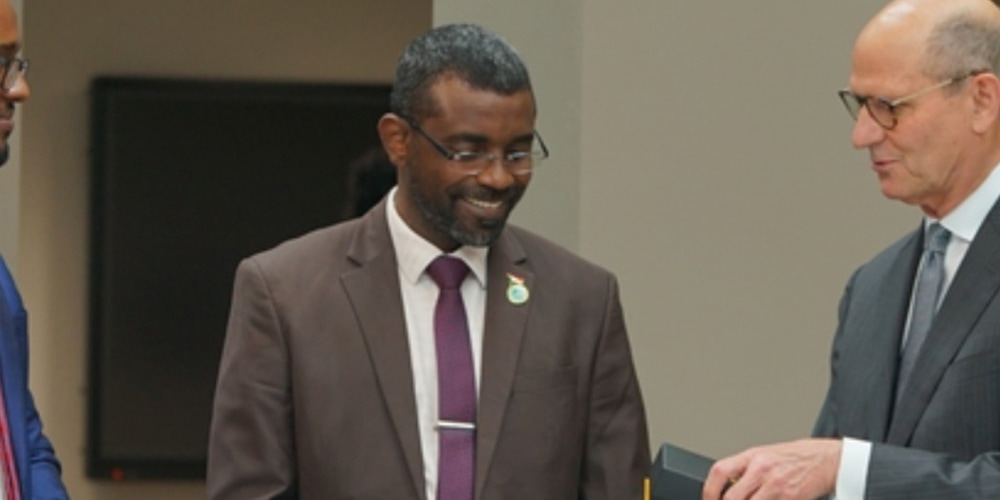
On Monday, May 24, 2021, Ted N. C. Wilson, president of the General Conference of Seventh-day Adventists and several selected General Conference (GC) delegates met with Nasr-Eddin Mofarah, minister of Religious Affairs and Endowments for the Republic of Sudan.
Mofarah was joined by Amira Agarib, deputy chief of Mission at the Republic of Sudan Embassy in the U.S., and Putrus Komi, advisor for Christian Affairs to the minister of Religious Affairs and Endowments. In addition to Wilson, GC representatives included individuals from Adventist Health Ministries, Women’s Ministries, the Adventist health-care system, and the Adventist Development and Relief Agency (ADRA).
“It all began with a telephone call,” Sheikh Muhammed Yousif, Sudan’s local liaison, said. “The minister expressed his desire to visit the headquarters of the Adventist Church during his visit to the United States.”
Mofarah’s visit stems from Sudan’s desire to reintegrate into the international commonwealth of nations. A vital component of this process is a deliberate effort of the new Sudanese government to engage the world with proof of openness to multiculturalism and peaceful multireligious coexistence.
“On a geo-socio-political scheme of international affairs and relations, the Republic of Sudan is at a junction in its long, rich, and complicated history,” Ganoune Diop, director of GC Public Affairs and Religious Liberty, said. “The country’s leaders have a renewed desire to see their national economy flourish, and they are taking serious steps in committing to justice by reinstituting worship places and allowing religious freedom in their country.”
A nation rich in mineral resources, Sudan is also in need of development in food security, health care, infrastructure, and overall economic stability. To this end, the government is in the midst of conversations with international political and humanitarian organizations. This includes visiting religious leaders around the world, and it was within this context that Mofarah requested an audience with Wilson.
“This was a highly unusual request coming from the Sudanese government,” Wilson said. “How could we not oblige? It was our hope that there would be increased rapport and understanding from the government regarding our church activities in Sudan.”
After Diop gave the minister a brief tour of the building and offered him an introduction to the Adventist Church, the two met Wilson in his office, where he greeted them in the modest Arabic he knew from his childhood in Egypt and welcomed them to the Adventist Church headquarters.
“He [Wilson] was inspired to utter the right words to our guests, and they were visibly touched,” Diop said. “The same occurred during the luncheon, when Elder Wilson shared insights from the book of Micah.”
Wilson quoted Micah 6:8, which offers instruction to all humans as to how they should live their lives: “Do justice, love mercy, and walk humbly with your God.”
In his speech at the beginning of the luncheon, Diop expressed to Mofarah and his colleagues that some of the key values of the foundation of the Adventist Church are a passion for saving lives and a commitment to health and healing.
“Of course,” Diop said, “for us as a community of faith, saving people is for prolonged life in the here and now, but we also have hope of eternal life.”
Diop continued by explaining how the Adventist Church has served and continues to serve in solidarity with the world: in health care, education, humanitarian assistance, human rights, women’s ministries, youth and children’s ministries, possibilities ministries, service to survivors of violence of all kinds, and more. He noted that ADRA has been operating in Sudan for 40 years.
“We have done our best to establish good relations with these leaders,” Diop said. “We recommend the local regional leaders to explore how we may help them to more efficiently fulfill their own national goals while also sharing our Christian witness and mission.
Diop said church leaders are praying for substantive follow-up and continued positive engagements with the Republic of Sudan, as it would greatly benefit many.
“The gift of the Holy Spirit is so evident in how God’s church works all over the world, especially in very challenging places,” Wilson said. “We expect this to continue to be the case in Sudan and that it will only grow through God’s great blessing.”
GC representatives said they felt the meeting was a success, noting that the minister and his entourage were interested and engaged throughout the day's activities and expressed appreciation for anything the church could do to help their country, especially in the areas of health and wellbeing.
“We praise God for His blessing of the meeting and His presence there,” Wilson said. “Our team did an exceptional job preparing, and we were able to share instruction from the Bible as well as pray for the group twice. We praise God for the newly established religious liberty and freedom of conscience promoted by the Sudanese government and guided by the Holy Spirit.”
Wilson added that church leaders intend to build on this initial foundation of a productive and mutually beneficial relationship and work closely with local church leaders as they move forward.
“We at the GC are wholly supportive of our MENA [the Middle East and North Africa Union] leaders,” Diop said. “They are the ones on the ground with grassroots involvements of global dimensions, consonant with and at the intersections of current needs of both the country of Sudan and the Seventh-day Adventist Church.”
The original version of this story was posted by Adventist News Network.